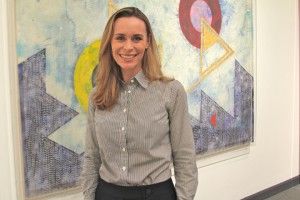That simple question has elicited much debate in the art world. Should they paint or sing songs all day? Study how to be a real artist or concentrate on art history or music appreciation?
Pepperdine Visiting Professor of Art History Kristen Chiem has her own answer.
“The most important thing that I would hope my students to take away from my classes is a global perspective,” said Dr. Chiem. “That is, a chance to learn about other cultures and to really learn how to engage with the world outside of Pepperdine.”
Dr.Chiem graduated from Middlebury College in 2000, including one year of international studying in Haerbing, China. After graduation, she traveled to China and stayed for one year, working with many famous Chinese artists.
In 2003, Chiem attended Harvard University and earned her M.A degree in regional studies, East Asia. Finally, when she got her Ph.D in Art History at University of California, she decided to be a professor, and has landed at Pepperdine University.
Chiem believes it is very important for students to have professors who can really open their eyes to new things and help them get a new perspective of the world.
When Chiem first studied in China as an undergraduate, she met a great mentor while studying of painting of the prominent contemporary artist.
“Rather than sit in on his classes, he gave me a key to his office so that I could study the books in his library and view his paintings in progress,” said Chiem. “On the weekends, he often invited fellow artists to his gallery, where I would look on as they spent long days painting and chatting about their works.”
Chiem added: “I learned so much about Chinese painting simply by observing them in action, and my Chinese language skills rapidly improved, too. To this day, I am deeply thankful for his generosity.”
She is most interested in Chinese culture, and overall, has lived in China three years. The first time she was exposed to Chinese culture was in college when she studied in the international program in China for one year. She went to Haerbing and met many Chinese artists who worked in the same field as she did. At that time, Chiem started developing on intense interest in Chinese art, which is very different form Western art.
When she returned to America and finished college, she decided to return to China because there were so many opportunities to learn about Chinese art. She lived in Nanjing, Yangzhou, Suzhou, Taiwan and Haerbing.
When she was in Yangzhou, she wrote some chapters for the book “Lifestyle and entertainment in Yangzhou,” which talks about the oral and visual arts, the literature, history and modern period of Yangzhou.
“I am interested in the history of Yangzhou because for 18 centuries, Yangzhou was one of the most important commercial centers in China and it was a very vibrant and artistic city,” said Chiem. “I am especially interested in gardens. I’m interested in studying how the visual imagery of the garden, such as birds, flowers, insects, expresses the cultural and spiritual lives of Chinese artists and their patrons.”
According to Cheim, the Chinese garden is not only an art form, but also it is a context for creating art.
Now Chiem is teaching Chinese painting and its history. “I love teaching Chinese painting here at Pepperdine because students really enjoy learning about an entirely different approach to art,” said Chiem. “It is a really exciting course because we can go to some local museums and get the chance to study all kinds of issues that related to Chinese culture.”
She added: “For students who are going to the Shanghai international study program and those who are interested in Asian art, it’s a good way to learn about China and its culture.”
Dr. Chiem is also teaching art appreciation.
“She is very patient and amiable,” said Li Wei, one of her students. “I really enjoy talking with her after classes. And she speaks Chinese to me sometimes after she knew that I am from China.”
It is not surprising to know that Chiem is good at speaking Chinese, since she has been in Chinese culture for years. She loves speaking Chinese but she does not have many chances to practice it in her daily life.
In the future, Chiem will continue teaching Chinese painting but also will work on some book projects about garden design related to Yangzhou and Suzhou.


